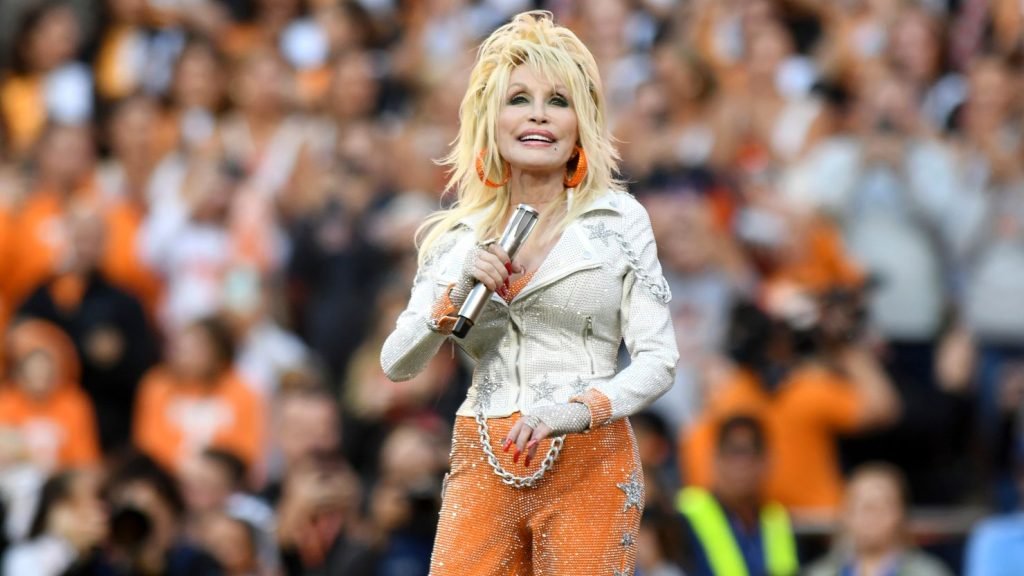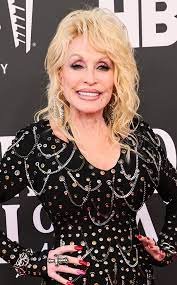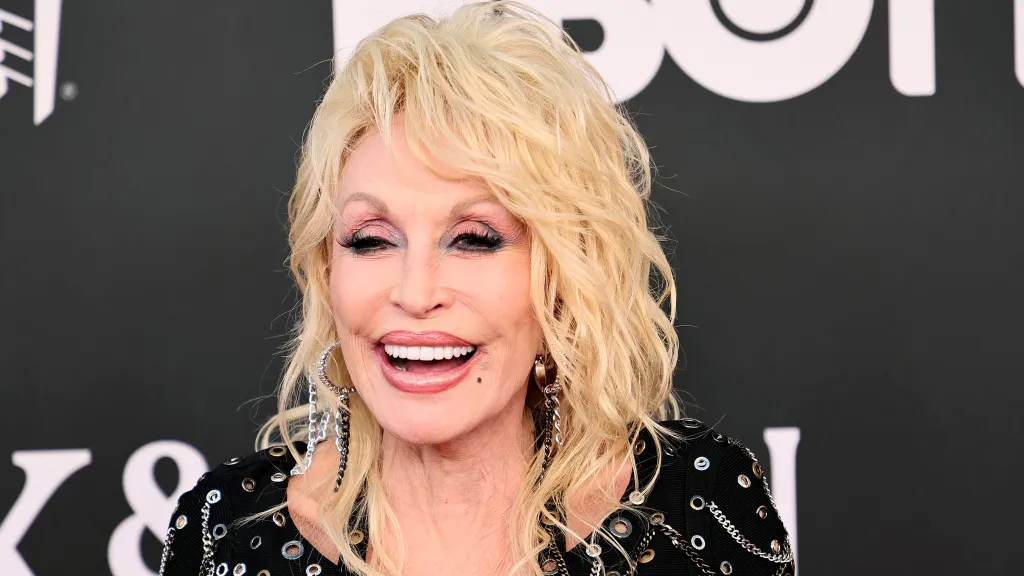Dolly Rebecca Parton (born January 19, 1946) is an American singer-songwriter and actress. She is known for her decades-long career in country music. After achieving success as a songwriter for others, Parton made her album debut in 1967 with Hello, I’m Dolly, which led to success during the remainder of the 1960s (both as a solo artist and with a series of duet albums with Porter Wagoner), before her sales and chart peak came during the 1970s and continued into the 1980s. Some of Parton’s albums in the 1990s did not sell as well, but she achieved commercial success again in the new millennium and has released albums on various independent labels since 2000, including her own label, Dolly Records.
Dolly Parton Facts
- Born : Dolly Rebecca PartonJanuary 19, 1946 (age 78)
- Pittman Center, Tennessee, US
- Occupations: Singer songwriter musician
- Years active : 1956–present
- Spouse : Carl Dean
- Genres: Country country pop
- Labels: GoldbandMercuryMonument
Dolly Parton Early life and career
Dolly Rebecca Parton was born on January 19, 1946, in a one-room cabin on the banks of the Little Pigeon River in Pittman Center, Tennessee.She is the fourth of twelve children born to Avie Lee Caroline (née Owens; 1923–2003) and Robert Lee Parton Sr. (1921–2000). Parton’s middle name comes from her maternal great-great-grandmother Rebecca (Dunn) Whitted. Parton’s father, known as “Lee”, worked in the mountains of East Tennessee, first as a sharecropper and later tending his own small tobacco farm and acreage. He also worked construction jobs to supplement the farm’s small income. Despite her father’s illiteracy, Parton has often commented that he was one of the smartest people she had ever known in regards to business and making a profit.

Parton’s mother cared for their large family. Her 11 pregnancies (the tenth being twins) in 20 years made her a mother of 12 by age 35. Parton credits her musical abilities to her mother; often in poor health, she still managed to keep house and entertain her children with Smoky Mountain folklore and ancient ballads. Having Welsh ancestors, Avie Lee knew many old ballads that immigrants from the British Isles brought to southern Appalachia in the 18th and 19th century. Avie Lee’s father, Jake Owens, was a Pentecostal preacher, and Parton and her siblings all attended church regularly. Parton has long credited her father for her business savvy, and her mother’s family for her musical abilities. When Parton was a young girl, her family moved from the Pittman Center area to a farm up on nearby Locust Ridge. Most of her cherished memories of youth happened there. Today, a replica of the Locust Ridge cabin resides at Parton’s namesake theme park Dollywood.The farm acreage and surrounding woodland inspired her to write the song “My Tennessee Mountain Home” in the 1970s. Years after the farm was sold, Parton bought it back in the late 1980s. Her brother Bobby helped with building restoration and new construction.
Parton has described her family as being “dirt poor”.Parton’s father paid missionary Dr. Robert F. Thomas with a sack of cornmeal for delivering her. Parton would write a song about Dr. Thomas when she was grown.She also outlined her family’s poverty in her early songs “Coat of Many Colors” and “In the Good Old Days (When Times Were Bad)”. For six or seven years, Parton and her family lived in their rustic, one-bedroom cabin on their small subsistence farm on Locust Ridge. This was a predominantly Pentecostal area located north of the Greenbrier Valley of the Great Smoky Mountains. Music played an important role in her early life. She was brought up in the Church of God (Cleveland, Tennessee)in a congregation her grandfather, Jake Robert Owens, pastored. Her earliest public performances were in the church, beginning at age six. At seven, she started playing a homemade guitar. When she was eight, her uncle bought her first real guitar.
After graduating from Sevier County High School in 1964, Parton moved to Nashville the next day. Her initial success came as a songwriter, having signed with Combine Publishing shortly after her arrival; with her frequent songwriting partner, her uncle Bill Owens, she wrote several charting singles during this time, including two Top 10 hits for Bill Phillips: “Put It Off Until Tomorrow,” and “The Company You Keep” (1966), and Skeeter Davis’s number 11 hit “Fuel to the Flame” (1967).Her songs were recorded by many other artists during this period, including Kitty Wells and Hank Williams Jr.She signed with Monument Records in 1965, at age 19; she initially was pitched as a bubblegum pop singer. She released a string of singles, but the only one that charted, “Happy, Happy Birthday Baby”, did not crack the Billboard Hot 100. Although she expressed a desire to record country material, Monument resisted, thinking her unique, high soprano voice was not suited to the genre.

After her composition “Put It Off Until Tomorrow”, as recorded by Bill Phillips (with Parton, uncredited, on harmony), went to number six on the country chart in 1966, the label relented and allowed her to record country. Her first country single, “Dumb Blonde” (composed by Curly Putman, one of the few songs during this era that she recorded but did not write), reached number 24 on the country chart in 1967, followed by “Something Fishy”, which went to number 17. The two songs appeared on her first full-length album, Hello, I’m Dolly.
Dolly Parton Music career
In 1967, musician and country music entertainer Porter Wagoner invited Parton to join his organization, offering her a regular spot on his weekly syndicated television program The Porter Wagoner Show, and in his road show. As documented in her 1994 autobiography, initially, much of Wagoner’s audience was unhappy that Norma Jean, the performer whom Parton had replaced, had left the show, and was reluctant to accept Parton (sometimes chanting loudly for Norma Jean from the audience). With Wagoner’s assistance, however, Parton was eventually accepted. Wagoner convinced his label, RCA Victor, to sign her. RCA decided to protect their investment by releasing her first single as a duet with Wagoner. That song, a remake of Tom Paxton’s “The Last Thing on My Mind”, released in late 1967, reached the country Top 10 in January 1968, launching a six-year streak of virtually uninterrupted Top 10 singles for the pair.
Parton’s first solo single for RCA Victor, “Just Because I’m a Woman”, was released in the summer of 1968 and was a moderate chart hit, reaching number 17. For the next two years, none of her solo efforts – even “In the Good Old Days (When Times Were Bad)”, which later became a standard – were as successful as her duets with Wagoner. The duo was named Vocal Group of the Year in 1968 by the Country Music Association, but Parton’s solo records were continually ignored. Wagoner had a significant financial stake in her future; as of 1969, he was her co-producer and owned nearly half of Owe-Par, the publishing company Parton had founded with Bill Owens.

Although her solo singles and the Wagoner duets were successful, her biggest hit of this period was “Jolene”. Released in late 1973, the song topped the country chart in February 1974 and reached the lower regions of the Hot 100 (it eventually also charted in the U.K., reaching number seven in 1976, representing Parton’s first U.K. success). Parton, who had always envisioned a solo career, made the decision to leave Wagoner’s organization; the pair performed their last duet concert in April 1974, and she stopped appearing on his TV show in mid-1974, although they remained affiliated. He helped produce her records through 1975.The pair continued to release duet albums, their final release being 1975’s Say Forever You’ll Be Mine.
Dolly Parton 1976–1986: Pop transition
Between 1974 and 1980 Parton had a series of country hits, with eight singles reaching number one. Her influence on pop culture is reflected by the many performers covering her songs, including mainstream and crossover artists such as Olivia Newton-John, Emmylou Harris, and Linda Ronstadt.
Parton began to embark on a high-profile crossover campaign, attempting to aim her music in a more mainstream direction and increase her visibility outside of the confines of country music. In 1976, she began working closely with Sandy Gallin, who served as her personal manager for the next 25 years. With her 1976 album All I Can Do, which she co-produced with Porter Wagoner, Parton began taking more of an active role in production, and began specifically aiming her music in a more mainstream, pop direction. Her first entirely self-produced effort, New Harvest…First Gathering (1977), highlighted her pop sensibilities, both in terms of choice of songs – the album contained covers of the pop and R&B classics “My Girl” and “Higher and Higher” – and production.Though the album was well received and topped the U.S. country albums chart, neither it nor its single “Light of a Clear Blue Morning” made much of an impression on the pop charts.

After New Harvest’s disappointing crossover performance, Parton turned to high-profile pop producer Gary Klein for her next album. The result, 1977’s Here You Come Again, became her first million-seller, topping the country album chart and reaching number 20 on the pop chart. The Barry Mann-Cynthia Weil-penned title track topped the country singles chart, and became Parton’s first Top 10 single on the pop chart (no. 3). A second single, the double A-sided “Two Doors Down”/”It’s All Wrong, But It’s All Right” topped the country chart and crossed over to the pop Top 20. For the remainder of the 1970s and into the early 1980s, many of her subsequent singles moved up on both charts simultaneously. Her albums during this period were developed specifically for pop-crossover success.
In 1978, Parton won a Grammy Award for Best Female Country Vocal Performance for her Here You Come Again album. She continued to have hits with “Heartbreaker” (1978), “Baby I’m Burning” (1979) and “You’re the Only One” (1979) all of which charted in the pop Top 40 and topped the country chart. “Sweet Summer Lovin'” (1979) became the first Parton single in two years to not top the country chart (though it did reach the Top 10). During this period, her visibility continued to increase, with multiple television appearances. A highly publicized candid interview on a Barbara Walters Special in 1977 (timed to coincide with Here You Come Again’s release) was followed by appearances in 1978 on Cher’s ABC television special, and her own joint special with Carol Burnett on CBS, Dolly & Carol in Nashville.
Parton served as one of three co-hosts (along with Roy Clark and Glen Campbell) on the CBS special Fifty Years of Country Music. In 1979, Parton hosted the NBC special The Seventies: An Explosion of Country Music, performed live at the Ford Theatre in Washington, D.C., and whose audience included President Jimmy Carter. Her commercial success grew in 1980, with three consecutive country chart number-one hits: the Donna Summer-written “Starting Over Again”, “Old Flames Can’t Hold a Candle to You”, and “9 to 5”, which topped the country and pop charts in early 1981. She had another Top 10 single that year with “Making Plans”, a single released from a 1980 album with Porter Wagoner, released as part of a lawsuit settlement between the pair.

The theme song to the 1980 feature film 9 to 5, in which she starred along with Jane Fonda and Lily Tomlin, not only reached number one on the country chart – in February 1981 it reached number one on the pop and the adult-contemporary charts, giving her a triple number-one hit. Parton became one of the few female country singers to have a number-one single on the country and pop charts simultaneously. It also received a nomination for an Academy Award for Best Original Song. Her singles continued to appear consistently in the country Top 10. Between 1981 and 1985, she had twelve Top 10 hits; half of them hit number one. She continued to make inroads on the pop chart as well. A re-recorded version of “I Will Always Love You”, from the feature film The Best Little Whorehouse in Texas (1982) scraped the Top 50 that year and her duet with Kenny Rogers, “Islands in the Stream” (written by the Bee Gees and produced by Barry Gibb), spent two weeks at number one in 1983.
In the mid-1980s, her record sales were still relatively strong, with “Save the Last Dance for Me”, “Tennessee Homesick Blues”, “God Won’t Get You” (1984), “Real Love” (another duet with Kenny Rogers), “Don’t Call It Love” (1985) and “Think About Love” (1986) all reaching the country Top 10 (“Tennessee Homesick Blues” and “Think About Love” reached number one; “Real Love” also reached number one on the country chart and became a modest crossover hit). However, RCA Records did not renew her contract after it expired in 1986, and she signed with Columbia Records in 1987.

